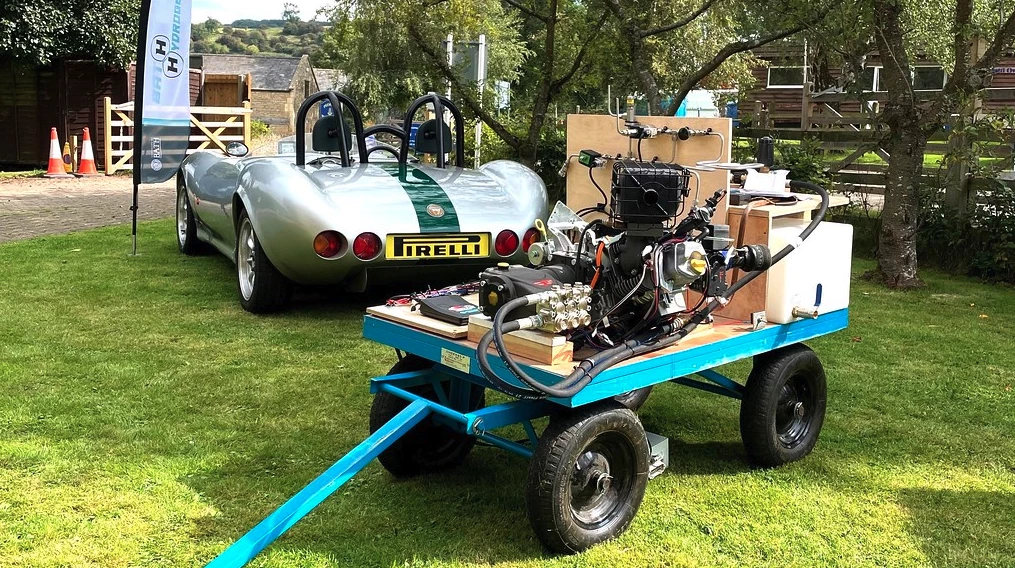Hydrogen-fueled combustion engines have slowly emerged in the mobility world, designed to run everything from race cars to pleasure boats. The latest hydrogen ICE to rumble to life was born with a special mission at its core: claim an all-out land speed record or two for the emerging hydrogen-combustion space. A team of students at the University of Bath have successfully gotten their first house-built hydrogen-burning prototype engine up and running and are moving forward with testing.
The Bath Hydrogen engineering team came up with the idea of a hydrogen combustion-engine world record tour in furtherance of the greater university's pioneering efforts in the hydrogen space. The University has set out to become a leader in research capacity, facilities and expertise in the production, storage, distribution and end use of hydrogen and carriers like ammonia.
Last month, the University announced plans to join the HyFIVE hydrogen consortium with the aim of exploring the use of hydrogen as a zero-emissions aviation fuel in the UK. The consortium will work to create a world-class hydrogen fueling system and supply chain for supporting zero-emissions aviation by the 2030s.
Back on the ground, the hydrogen speed record team recently switched on their hydrogen-converted single-cylinder combustion engine for the first time. While they have their sights on bolder records, the feat is said to be a world first for undergraduates developing and running a hydrogen ICE.
The newly cleaned engine started off as a single-cylinder generator engine supplied by sponsor Vanguard (Briggs & Stratton) and selected for its simplicity and adaptability. The team reengineered the engine to work with hydrogen, relying on help and components from various corporate sponsors, including hydrogen-specific fuel injectors supplied by Clean Air Power.
"Hydrogen-fueled engines work very differently to normal petrol ones and require different parts that are not commercially available," explained Samuel Ray, Bath Hydrogen team leader. "We are lucky to have received help and equipment from our sponsors. We worked hard alongside Link Engine Management to program their ECU to work with hydrogen, for example."
The team's work was made even more challenging by the fact that none of the students had prior experience working with hydrogen or much knowledge about its use as a fuel.
"We started by reading all of the research and literature we could find, analyzing and cataloging it all to understand it and prioritize what was possible for us to pull off, as a fairly small team."
It seems the research and hands-on hard work have paid off so far, as the engine fired up on the first try. This version is simply a proof-of-concept and test bed that precedes the unit that will serve as the beating heart of the team's land speed record objectives. The record-targeted engine will be a Ford 2.3-liter EcoBoost adapted to hydrogen. Once ready, it will be mounted to the voluptuous Ginetta G20 pictured up top in pursuit of myriad hydrogen-combustion land speed records.

Beyond merely modifying the engine to run on hydrogen, the team will also need to engineer around hydrogen's pitfalls. Its plans call for equipping the vehicle with a fueling system built to FIA standards and an integrated fire suppression system. The current prototype engine is mounted to a cart for testing and must be operated outside via remote control panel to meet safety requirements.
The Hydrogen team comprises 15 third- and fourth-year students focused on various areas of engineering study, including automotive engineering and electrical engineering. It serves as one of the successors to the university's successful Team Bath Formula Student racing team, which was discontinued in 2022 to shift focus on zero-emissions vehicles.
We look forward to seeing the team's work and land speed record attempts. Much like professional racing, land speed records should prove a helpful means of advertising hydrogen combustion's ability to offer the desirable attributes of traditional gas and diesel ICEs, only without the CO2 emissions.
And in case you're wondering if this might be the first land speed record attempt using hydrogen combustion power, it's not. In fact, BMW previously set a total of nine world records with the truly ahead-of-its-time hydrogen V12-powered HDR single-seater way back in 2004.
Source: University of Bath




